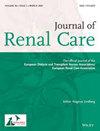Perceptions of peritonitis risk, prevention, diagnosis and stigma: Findings from a mixed methods study with patients and relatives using peritoneal dialysis
Abstract
Background
Peritonitis is the main treatment-related complication of peritoneal dialysis and a primary concern for patients and their relatives. Therefore, understanding their perceptions of peritonitis is important.
Objectives
To explore patients' and relatives' perceptions of peritoneal dialysis-associated peritonitis risk, prevention measures and experiences of diagnosis, and experience of perceived stigma.
Design
A sequential mixed methods study design was used, including a questionnaire and semi-structured interviews.
Participants
Patients using peritoneal dialysis and relatives (n = 75) from six National Health Service organisations from the United Kingdom.
Measurements
A structured questionnaire was administered with patients and relatives (n = 75) using peritoneal dialysis; data were analysed using descriptive statistics. Thirty questionnaire respondents were then purposively sampled and interviewed in-depth; data were analysed thematically. Data were collected 2017−2018. Ethical and governance approvals were gained.
Results
Qualitative and quantitative analyses were integrated and three themes presented:
- •
Perceptions of risk: participants assessed their risk of developing peritonitis and possible implications on their health and relatives. Participants felt greatly responsible for preventing infection.
- •
Preventing peritonitis: participants reported similar and some differing measures to minimise their risk of developing peritonitis. Participants wanted to be seen as “clean”.
- •
Diagnosis of peritonitis: peritonitis diagnosis was embarrassing and stigmatising for many individuals. This was influenced by the response of healthcare professionals and the cause of peritonitis.
Conclusions
It is important that healthcare professionals are aware of how responsible patients and relatives feel about preventing peritonitis, the emotional effect of this responsibility and crucially the impact this may have on seeking help.

 求助内容:
求助内容: 应助结果提醒方式:
应助结果提醒方式:


